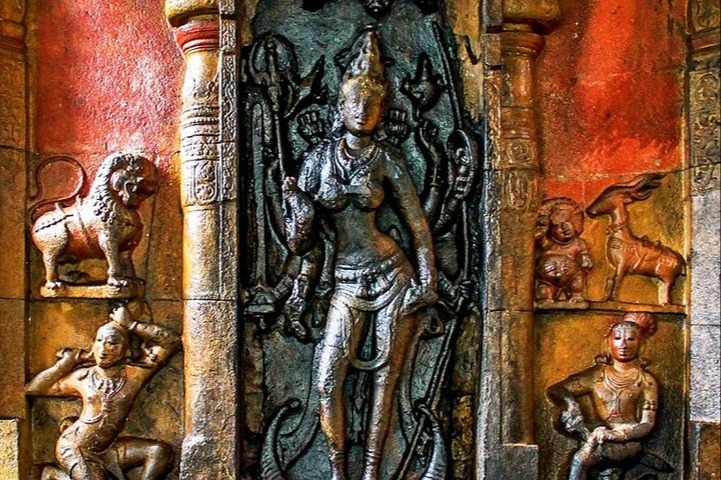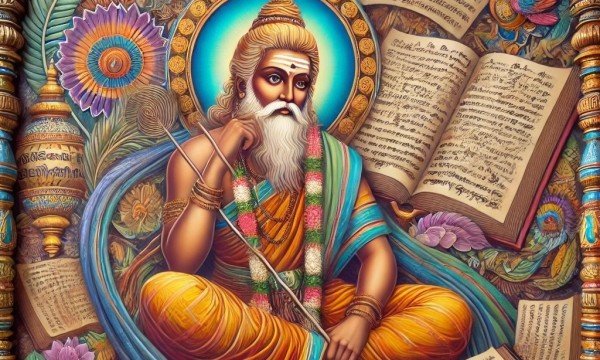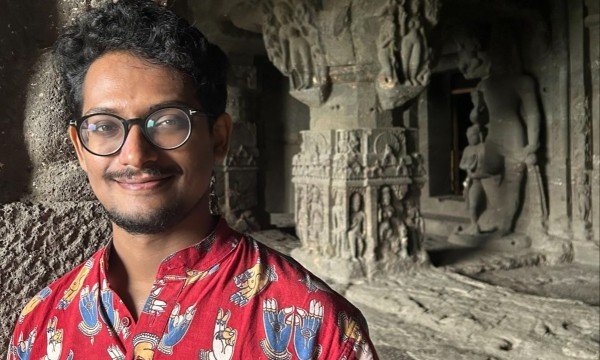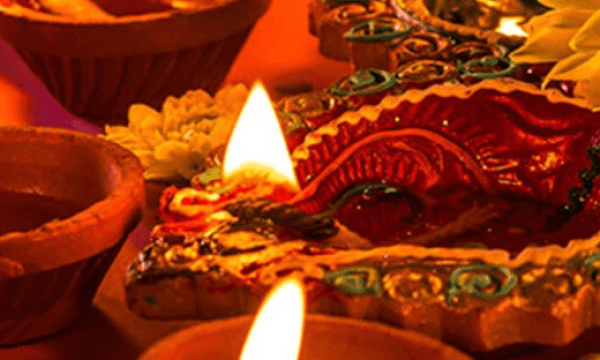
I often get asked whether there are references to Navratri in ancient Tamil literature (referred to as Sangam literature). The answer is no - there is no direct reference to Navratri. The Hindu myth of Goddess Durga's nine-day battle against a demon, culminating in her victory on the tenth day (Vijayadashami), is notably absent from earlier Sangam texts like the Tholkappiyam and the Purananuru. Today, the Tamil society still celebrates Navratri differently from many other Hindus. For Tamils, the celebration goes beyond a good versus evil narrative; it emphasizes the embodiment of essential qualities such as education represented by Saraswati, wealth symbolized by Lakshmi, and strength personified by Durga. Some even refer to parts of the festivity as “Saraswati Poojai” where students place their books in front of the goddess along with food offerings and prayers. I have not yet discovered the reasons behind the significant differences in how Tamils and other regions of South India celebrate Navratri, particularly in relation to the mythological story of the Hindu Goddess Durga. However, it may be rooted in the Tamil tradition of ancestral worship, particularly the veneration of the mother goddesses, collectively referred to as Amman.
Although Navratri is not an indigenous Tamil festival, it is a favourite of many, including myself. This is probably due to the Tamil worship of “Ammans - the worship of mother goddesses”. Amman is derived from “amma aana” (one who became mother). Some claim that the most number of temples in Tamil Nadu are devoted to Ammans. There are many scholars who argue that Tamil society was a matrilineal society in the past who predominantly worshipped the mother goddess. A distinctive aspect of indigenous Tamil goddesses is that many of them were ordinary women who attained goddess status through their life experiences in protecting and nurturing those around them. In other words, it is linked to ancient Tamil practice of ancestral worship - praying and erecting stones for ancestors who died by defending their village and people.
With that in mind, I would like to introduce you to three indigenous Tamil goddesses who are gradually being forgotten and merged with mainstream Hindu goddesses:
-
Kotravai: Goddess of War
Kotravai, worshipped as the goddess of war, is one of the most ancient goddesses of Tamil society, described extensively in ancient Tamil literature. In Tholkappiyam, the earliest Tamil literature that we have today, she is described as the mother goddess of Palai, one of the five ecological regions of ancient Tamil Nadu. In Purananuru, there are references to warriors invoking Kotravai to bring courage and strength to those heading to war. Ancient Tamil texts elaborate on rituals that are performed to appease Kotravai before heading to war. Kotravai, a goddess with a rich historical background, is unfortunately often merged with the Hindu goddess Durga. This assimilation into mainstream Hinduism has led to the erosion of Kotravai's distinct identity. This blending is problematic, as the rituals and origins of these goddesses would provide valuable insights into the lives and beliefs of ancient Tamil society.
-
Mariamman: Goddess of Rain and Smallpox
Unlike Kotravai, Mariamman is still quite popular, but many are not familiar with her historical roots. “Mari” means rain. As such, she is regarded as the mother goddess of rain.
During Aadi (Tamil month of July), as farmers start preparing for the new agriculture season, they conduct festivities for the goddess of rain, Mariamman, as rain is often non- existent in Aadi. Hence, this is why there are no weddings conducted in the Tamil month of July. She is also worshipped as the goddess of smallpox, which used to mostly break out in the summer months of Aadi. Hence, the worship here is aimed at soothing the wrath of the Goddess, to cool her, and invoking her blessings.
According to legend, a devastating smallpox epidemic struck during the month of Aadi. A mysterious woman, Mari, was nursing the sick,advising them to prepare liquid porridge (koozh) mixed with onions and syringa leaves. It is believed that she saved thousands of lives. This is why you will see Amman temples serve special Aadi Koozh.
-
Periyachi amman (also referred to as Pechi amman): Goddess of fertility
Periyachi amman is the indigenous goddess of fertility and childbirth. According to mythology, she was a knowledgeable obstetrician who was also well versed in the martial arts. According to legend, she was suddenly summoned in the middle of the forest to assist with the birth of the king’s child. No tools were provided but unique instructions were given to her on how the delivery should be conducted as per the king’s astrological beliefs. She successfully delivered the baby, but the king sought to kill the baby based on his astrological beliefs. Periyachi, skilled in martial arts, courageously killed the king to protect the infant, raising the child as her own. During her lifetime, she saved many lives of pregnant women and babies. After her death, in accordance with the ancestral worship customs of indigenous Tamils, places of worship were established in her honor, where specific rituals were conducted for pregnant women and newborns. However, like other Tamil indigenous goddesses, Periyachi amman worship is also becoming extinct and often merged with Hindu goddesses. Specifically, Periyachi amman is often merged with the Hindu goddess Kali as they both have fierce features.
Interestingly, some of these indigenous goddesses such as Mariamman and Periyachi amman continue to be popular and worshipped outside of Tamil Nadu. During the colonial period, indentured laborers took their worship to places like South Africa and Southeast Asia, where worship of these goddesses continue to prosper. Interesting right?
While Navratri may not be an indigenous Tamil festival, celebrating our courageous ancestral mothers—our ammans—certainly is. Take this opportunity to learn about and reconnect with our indigenous goddesses.
Sources:
-
தெய்வம் என்பதோர் by Tho Paramasivan
-
பண்பாட்டு அசைவுகள் by Tho Paramsivan
-
The Sweet Salt of Tamil by Tho Paramasivan
-
Ancient Tamil texts: Tholkappiyam,Purananuru
-
History of Periyachi Amman by Stories of ™
**To learn more about ancient Tamil customs and practices follow @whatthepottu.


























